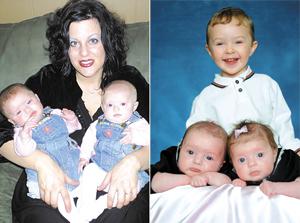|
AN ARTICLE HOSTED BY IMPREGNORIUM.NET MULTIPLE BIRTHS NOW MORE COMMON
A lot of area couples are seeing double these days, thanks to advancements in the field of fertility. There were 14 sets of twins born from July 2005 to July 2006 at Chambersburg Hospital, according to Dr. Sohael Raschid, an OB/GYN for the past 20 years and president of the medical staff at Chambersburg Hospital. Eight sets of twins were born at Waynesboro Hospital during the same period, according to a spokesman.
“Over the last 25 years, the incidence of twin births has risen more than 50 percent and rates of triplets and higher births have quadrupled,” according to Dr. Lisa N. Miller of Potomac OB/GYN in Waynesboro. “This is mostly, but not completely, explained by the rising number of couples using in vitro fertilization to conceive because of problems with infertility,” she added.
“Ten to 15 years ago, we developed the technique for test tube babies ... taking the egg from a woman, sperm from a man, fertilizing the egg and putting it back in the womb.
“When we initially started
this, we weren't very good at it, because we didn't know how many eggs
it would take,” Raschid said.
“The initial solution was selective reduction ... terminating the maximum for survival of the few ... and some physicians had moral and religious issues with the technique,” Raschid explained.
Physicians are no longer faced
with that decision because they are getting “better and better
at the technique,” usually resulting in women becoming pregnant
with either triplets or twins, according to Raschid.
The rate of identical twins is four in 1,000 births, according to Miller, and does not vary with maternal characteristics like age and race.
The rate of fraternal (non-identical)
twins is affected by maternal age and race. There are higher rates of
fraternal twins in black women and women between the ages of 35 to 40,
she added.
There also is an increased risk of birth defects and maternal complications such as high blood pressure, she said.
Twins rarely go undiagnosed
because of the widespread use of ultrasound in the second trimester
for all pregnant women, according to Miller.
There also is an increased chance cesarean sections because it is more common in twins for one or both babies to be breech or transverse (on the side) rather than “head down,” Miller noted. “If both babies are head down, vaginal delivery is recommended,” she said.
Bill and Justine Sagonas of Chambersburg were shocked when they learned Justine was pregnant with twins.
“I knew right away, at
the first ultrasound at six weeks,” said Justine, 35, who conceived
the babies naturally.
“It took a while for the news to sink in.”
Amera, who weighed 5 pounds,
14 ounces, and Solena, who weighed 6 pounds, 3 ounces, were born three
weeks early, on Aug. 19, in Chambersburg Hospital.
Justine, co-owner of Ambiance Hair Studio in Chambersburg, said child care was her first concern. “I knew I couldn't take off forever.” Now that the twins are here, Justine said it's difficult to take them anywhere because of the attention they attract. The twins look very similar, but their personalities are quite different, she said. “Amera (a Greek Italian name) is more reserved and very dainty,” according to Justine. “Solena (named for her grandmother, Helena Solo), is going to be a character.” Shippensburg twins Walter and Kristin Marchewka of Shippensburg welcomed their twin daughters, Alexis and Alaini, Aug. 15, in Chambersburg Hospital. The twins and the couple's 2-year-old son, Brayden, were conceived through in vitro fertilization, according to Kristin. “They're wonderful ... just so precious. I feel like I'm completely blessed with all three. They are our miracle babies.” Brayden was very excited about the twins' homecoming and “is really good with them,” Kristin said.” Alexis is very laid back and relaxed, while Alaini is a “high maintenance baby. She needs more attention.” Alexis can entertain herself with a toy, but Alaini likes to be held and nursed, Kristin noted. “Everybody always stops me ... I don't mind it so much. They're perfect. I like to show them off.” The International Moms Club in Shippensburg is a great support group for stay-at-home moms, according to Kristin. “They really helped me when I was on bed rest, coming to the house and playing with Brayden and making lunch for us,” she said. The couple knew very early in the pregnancy that Kristin was pregnant with twins. “With in vitro, you're prepared for the chance for multiples,” she said. Still, the Marchewkas were shocked by the news that they were going to have twins. “With Brayden, we transferred three embryos and one took. This time we transferred two embryos and both took.” The three children need a total of 30 diapers a day. “We knew we'd go through a lot, but that's something we weren't prepared for.”
|
|
|

